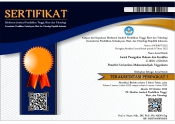Identification of Predicate Crimes Related to Binary Options Affiliates Money Laundering Crime
Abstract
Keywords
Full Text:
PDFReferences
Arief, B. N. (2003). Kapita Selekta Hukum Pidana. Bandung: Citra Aditya Bakti.
Baker, H. K., Nofsinger, J. R., & Puttonen, V. (2020). Other Frauds and Scams that Lure Unsuspecting Investors. In The Savvy Investor’s Guide to Avoiding Pitfalls, Frauds, and Scams (pp. 149–177). Emerald Publishing Limited. https://doi.org/10.1108/978-1-78973-559-820201010
Cox, R., Kamolsareeratana, A., & Kouwenberg, R. (2020). Compulsive gambling in the financial markets: Evidence from two investor surveys. Journal of Banking & Finance, 111, 105709. https://doi.org/10.1016/j.jbankfin.2019.105709
Fathurrachman, F., & Setiawan, D. A. (2022). Pertanggungjawaban Pidana Bagi Pelaku Affiliator terhadap Korban Trading Binary Option Ditinjau dari UU Nomor 19 Tahun 2016 tentang Perubahan Atas UU Nomor 11 Tahun 2008 tentang Informasi dan Transaksi Elektronik. Bandung Conference Series: Law Studies, 2(2). https://doi.org/10.29313/bcsls.v2i2.2536
Ferdiansyah, M. A., & Simangunsong, F. (2022). Pertanggung Jawaban Pelaku Binary Option Terhadap Hukum Positif Di Indonesia. Bureaucracy Journal : Indonesia Journal of Law and Social-Political Governance, 2(2), 628–648. https://doi.org/10.53363/bureau.v2i2.93
Garnasih, Y. (2017). Penegakan hukum anti pencucian uang dan permasalahannya di Indonesia. Jakarta: Universitas Indonesia Fakultas Hukum Pascasarjana.
Imanpour, M., Rosenkranz, S., Westbrock, B., Unger, B., & Ferwerda, J. (2019). A microeconomic foundation for optimal money laundering policies. International Review of Law and Economics, 60, 105856. https://doi.org/10.1016/j.irle.2019.105856
Kiiskinen, E. (2016). Risks vs Return with Binary Option Trading (Bachelor’s Thesis, Lahti University of Applied Science, Lathi, Finland). Retrieved from https://www.theseus.fi/bitstream/handle/10024/120432/Kiiskinen_Eemi.pdf ?sequence=2
Lelonek-Kuleta, B., & Bartczuk, R. P. (2021). Online Gambling Activity, Pay-to-Win Payments, Motivation to Gamble and Coping Strategies as Predictors of Gambling Disorder Among e-sports Bettors. Journal of Gambling Studies, 37(4), 1079–1098. https://doi.org/10.1007/s10899-021-10015-4
Lestari, R. I., & Arifin, Z. (2022). Godaan Praktik Binary Option Berkedok Investasi Dan Trading. Jurnal Ius Constituendum, 7(1), 19. https://doi.org/10.26623/jic.v7i1.4875
Mantulangi, N. (2017). Kajian Hukum Investasi dan Perlindungan terhadap Korban Investasi Bodong. Lex Administratum, 5(1).
Novruzova, O. B., Pronina, Y. O., & Vorobeva, E. S. (2020). Binary Options as New Financial Instruments and Their Integration into the Financial Sector. Proceedings of the 2nd International Scientific and Practical Conference “Modern Management Trends and the Digital Economy: From Regional Development to Global Economic Growth” (MTDE 2020). Paris, France: Atlantis Press. https://doi.org/10.2991/aebmr.k.200502.123
Pamungkas, F. T., & Zulfikar, A. A. (2021). Peran Otoritas Jasa Keuangan (OJK) dalam Mengawasi Adanya Fraud dalam Bisnis Investasi dalam Perspektif Hukum Ekonomi Islam. Jurnal Penegakan Hukum Dan Keadilan, 2(1). https://doi.org/10.18196/jphk.v2i1.9507
Pujiani, R. S., Putri, N. M., & Aksan, M. A. (2023). Binary Option: Legality in the Perspective of National and Islamic Law as a Manifestation of Continuous Legal Reform. Semarang State University Undergraduate Law and Society Review, 3(1), 71–90. https://doi.org/10.15294/lsr.v3i1.57092
Siahaan, N. H. T. (2005). Pencucian Uang dan Kejahatan Perbankan. Jakarta: Sinar Harapan.
Singh, K., & Best, P. (2019). Anti-Money Laundering: Using data visualization to identify suspicious activity. International Journal of Accounting Information Systems, 34, 100418. https://doi.org/10.1016/j.accinf.2019.06.001
Sutedi, A. (2008). Tindak Pidana Pencucian Uan. Bandung: Citra Aditya Bakti.
Tertychnyi, P., Godgildieva, M., Dumas, M., & Ollikainen, M. (2022). Time-aware and interpretable predictive monitoring system for Anti-Money Laundering. Machine Learning with Applications, 8, 100306. https://doi.org/10.1016/j.mlwa.2022.100306
Vinkler, D. A., Permuter, H. H., & Merhav, N. (2016). Analogy between gambling and measurement-based work extraction. Journal of Statistical Mechanics: Theory and Experiment, 2016(4), 043403. https://doi.org/10.1088/1742-5468/2016/04/043403
Law/Regulation
Undang-Undang Repulik Indonesia Nomor 1 Tahun 1946 tentang Peraturan tentang Hukum Pidana.
Undang-Undang Republik Indonesia Nomor 8 Tahun 2010 tentang Pencegahan dan Pemberantasan Tindak Pidana Pencucian Uang
Undang-Undang Republik Indonesia Nomor 19 Tahun 2016 tentang Perubahan Atas Undang-Undang Nomor 11 Tahun 2008 tentang Informasi dan Transaksi Elektronik
DOI: https://doi.org/10.18196/jphk.v4i2.18013
Refbacks
- There are currently no refbacks.
Editorial Office:
Master of Law, Universitas Muhammadiyah Yogyakarta
Second Floor of Postgraduate Building
Jl. Brawijaya, Tamantiro, Kasihan, Bantul, D.I. Yogyakarta, Indonesia 55183
Phone: 08224531887
Fax: (0274) 387646
Email: jphk@umy.ac.id

